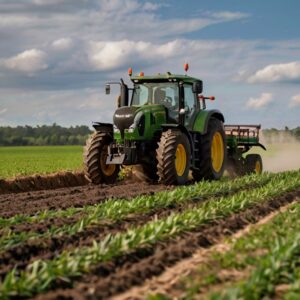In the world of agriculture and farming, equipment durability and longevity are non-negotiable. With the constant exposure to harsh elements and aggressive usage, finding a robust protective layer for machinery becomes paramount. Enter Polyurea – a superhero in equipment protection.
Why Choose Polyurea for Farming Equipment?

Polyurea coatings are incredibly tough. They have the unique ability to resist scraping, scratching, and impacts that would typically leave marks on traditional materials. When it comes to farming equipment, which often encounters rough surfaces, sharp objects, and heavy loads, Polyurea’s resilience ensures that machinery remains unscathed and functional over years of use.
Farms and agricultural environments often involve exposure to a variety of chemicals, from fertilizers and pesticides to animal waste. Polyurea coatings exhibit an excellent resistance to these substances, safeguarding the equipment against corrosion and damage that could otherwise compromise their integrity and lifespan.
Be it blistering sun, pouring rain, or freezing temperatures, Polyurea coatings stand strong. Their weatherproof attributes ensure that neither UV rays nor moisture can penetrate through, offering an all-season protection that keeps equipment reliable and operational no matter the weather conditions.
In agricultural operations, time is of the essence. Polyurea’s fast curing time means that equipment can be coated and put back to use in an impressively short timeframe, minimizing downtime and ensuring that productivity remains uninterrupted.
Application of Polyurea in Agricultural and Farming Equipment
The versatility of Polyurea makes it suitable for a wide range of applications in the agriculture and farming sector. Here’s how it’s transforming the resilience of farming equipment:
These are the workhorses of the agricultural world, enduring constant exposure to the elements and demanding workloads. A Polyurea coating shields them against abrasion, rust, and wear, prolonging their service life significantly.
Leakages and water loss are critical concerns in farming operations. Polyurea serves as an excellent sealant for irrigation channels, reservoirs, and water tanks, ensuring maximum water retention and preventing wastage.
Storage units for grains, feed, and fertilizers need to be protected against moisture and pests. Polyurea coatings provide an impenetrable barrier, keeping contents dry and secure, which is crucial for maintaining quality and preventing spoilage.
Farm buildings, fences, and other infrastructure benefit immensely from Polyurea coatings. By sealing out moisture and resisting environmental stresses, these structures remain sturdy and functional for longer periods, reducing the need for frequent repairs or replacements.
Practical Tips for Applying Polyurea Coatings
When it comes to applying Polyurea coatings, especially on agricultural equipment, the importance of surface preparation cannot be overstated. Achieving an optimal bond between the coating and the equipment surface is crucial for the longevity and effectiveness of the Polyurea application. This process involves meticulously cleaning the target surfaces to remove any dust, debris, oils, or contaminants that might interfere with adhesion. It’s essential to ensure that the surface is completely dry and free from any moisture, as even small amounts of water can have a significant impact on the coating’s performance. The goal is to create a pristine, uncontaminated surface that allows the Polyurea to form a strong, durable bond, thereby maximizing its protective qualities and ensuring the coated equipment can withstand the rigors of agricultural use.
Given the unique properties of Polyurea, including its rapid cure time and the necessity for achieving uniform coverage, it is strongly recommended to engage professionals who have substantial experience with Polyurea applications. The swift nature of the curing process means there’s little room for error; once the application begins, the Polyurea will start to set very quickly. This characteristic, while beneficial for rapid project completion, also demands precise and skilled application techniques to ensure an even, thorough coating. Professionals equipped with the right tools and expertise can navigate these challenges effectively, ensuring that the application process leads to optimum results. Their knowledge in handling Polyurea can make a significant difference in the quality and durability of the coating, ultimately providing a seamless, robust protective layer for agricultural equipment.
In addition to surface preparation and professional application, regular inspection of the coated surfaces plays a pivotal role in the maintenance of agricultural equipment covered with Polyurea. Despite its renowned durability and resistance to various forms of damage, no coating is entirely invulnerable. Regular inspections enable the early detection of any wear, tear, or minor damage that might occur over time. By identifying and addressing these issues promptly, one can prevent minor concerns from developing into major defects that could compromise the protective integrity of the Polyurea coating. Regular monitoring and maintenance ensure that the equipment remains in optimal condition, safeguarding the significant investment in both the machinery and the protective coating, and extending the service life of the agricultural equipment.
Embracing Polyurea for Future-Proof Farming
The agricultural sector continuously seeks innovations to enhance productivity and sustainability. Adopting Polyurea as a protective layer for equipment is a forward-thinking approach that pays dividends in durability, efficiency, and overall operational resilience. By investing in this advanced coating technology, farmers and agricultural professionals can safeguard their machinery against a multitude of environmental and operational hazards, ensuring that their equipment remains a reliable ally in the relentless pursuit of farming excellence.
While the initial costs may be higher compared to traditional coating systems, the long-term benefits – including extended equipment life, reduced maintenance costs, and uninterrupted operations – make Polyurea an exceptional protective solution for the agricultural industry. As farming operations evolve and face new challenges, Polyurea coatings stand ready to protect and serve, ensuring that our agricultural backbone remains strong and efficient for generations to come.
